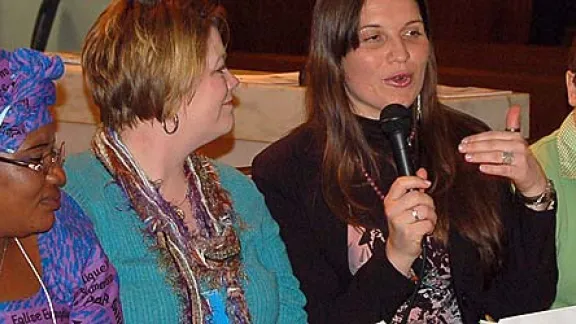
Left to right: Jeannette Ada Maina (EELC), Jessica Arneson (ELCA), Daniele Schmidt Peter (IECLB) and Irma RodrÃguez-León (ELCA) during a side event on rural womenâs empowerment at the United Nations 56th Commission on the Status of Women in New York, USA. © ELCA/Kate Gaskill
LWF Participants at UN Session Lift Up the Voices of Rural Women Worldwide
Rural women around the world are planting seeds of hope in their communities.
That was the message from The Lutheran World Federation (LWF) women as they gathered in New York prior to the 56th Session of the United Nations Commission on the Status of Women (UN CSW), taking place 27 February to 9 March.
Daniele Schmidt Peter of the Evangelical Church of the Lutheran Confession in Brazil (IECLB) said the goal of the Lutheran women was to connect with other women, learn from them and be strengthened by their actions.
“We need to rethink out projects of sustainable development to include women and youth. As people connected to the work of rural women, we as civil society here have great potential to take actions, discuss, organize and demonstrate to our governments,” Schmidt Peter said.
Rural women have knowledge about seeds and practicing agriculture without chemicals as it has been carried out in the past, she said. In addition, Schmidt Peter advocated education programs to help bring change to rural communities, including greater involvement of women.
Established in 1946, the UN CSW is a functional commission of the UN Economic and Social Council and meets annually. This year’s theme is “The empowerment of rural women and their role in poverty and hunger eradication, development and current challenges.”
Some 300 non-governmental organizations and 4,000 participants gathered in New York to raise up the stories of women and girls worldwide. Lutheran women from Brazil, Cameroon and the United States offered a program titled “From Potential Impoverishment to Seeds of Sustainability.”
Speaking at the event, sponsored by the Lutheran Office for World Community (LOWC), a joint ministry of the LWF and the Evangelical Lutheran Church in America (ELCA) at the UN, Jeannette Ada Maina of the Evangelical Lutheran Church of Cameroon (EELC) underscored the role of rural women in development.
Gift of the Communion
“For me, the hope of all rural development is based on women, particularly on rural women,” Ada said. “They play an essential role in development. In addition, these rural women care for many lives. The products from their farms feed not only their families, but ours also.
“In this way, they care for our lives, and we owe it to them to make their voices heard. Some say these women are voiceless. No one is voiceless. We have to provide the place for them to express themselves,” she urged.
LWF Council member, Mikka McCracken of the ELCA, said the gathering of Lutheran women at the UN offered the organization a “living witness of our life in the LWF communion.”
McCracken added, “The gift of the communion to the UN CSW is the gift of the life stories of rural women, who are active not only in their families and communities, but through and with the churches.”
UN Women
Michelle Bachelet, executive director of UN Women, affirmed women’s role in ending poverty and hunger, and she urged women to take up the call. “‘Women are at the heart of ending poverty and hunger. […] We cannot do this alone. We depend on you.”
Following her plea, a group of ELCA women agreed to consider the intersections between hunger, poverty, gender justice and advocacy. “Let us take up that call in the life of the LWF Communion and all our member churches,” added McCracken.
Christine Mangale, assistant to the director at LOWC, who is originally from the Kenya Evangelical Lutheran Church and part of Ecumenical Women, emphasized the importance of the presence of the LWF women at the UN meetings.
“We wait all year for these women to come and bring life and their stories to the United Nations,” Mangale said.
Commenting on the New York meeting, Rev. Dr Elaine Neuenfeldt, executive secretary for Women in Church and Society (WICAS) in the LWF Department for Mission and Development (DMD), noted that women’s empowerment involves a process of transforming gender power relations that create systems of privilege and oppression. She emphasized the need therefore, to develop awareness about women’s subordination then building capacity to challenge and transform these systems.
“If women are to be empowered, they must have information so that they are able to access power and transform the exclusive way land and economic rights are ordered. With the right tools, women can exercise their citizenship, no matter where they live. They are agents of their own change,” added Neuenfeldt.
(756 words)


